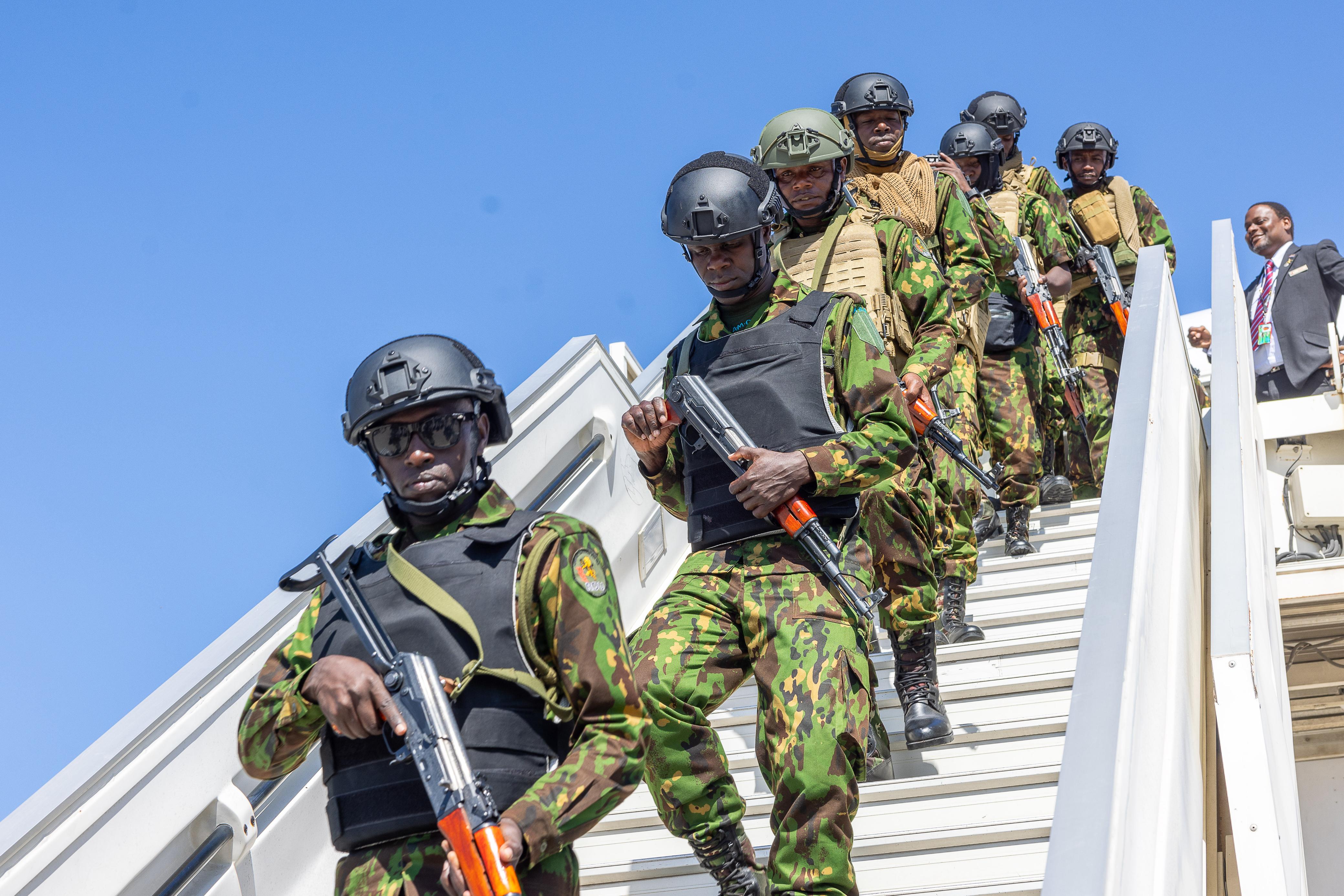
President William Ruto held a telephone conversation with UN Secretary General Antonio Guterres about the ongoing Multinational Security Support Mission in Haiti on Thursday.
Kenya leads the MSS mission with more than 800 police officers already in Haiti.
Ruto said during the Thursday night talks that the UN boss acknowledged the role Kenya plays in the mission.
“He acknowledged Kenya’s leadership role and commended our steadfast commitment to our shared goal of restoring stability in Haiti,” he said in a post on his social media.
The development came amid surging criminal gangs in Port-au-Prince.
So far, two Kenya police officers have been killed in the mission since they arrived there last June.
At least three other officers are nursing bullet wounds after being attacked by armed criminal gangs.
Some officers on the ground have complained about a lack of resources in their mission, hence the setbacks.
Thousands of Haitians marched through the streets of the country’s volatile capital on Wednesday, April 2, defying tear gas and gangs as they vented their anger against the surge in gang violence.
The protesters demanded the resignation of the country’s transitional authorities and the head of the Haiti National Police.
During the massive protest, demonstrators brandished machetes and firearms.
Others waved tree branches and red and black flags, once the symbol of the Duvalier dictatorship, but which have since become associated with other forces in Haiti.
Protesters burned tires and blocked roads as they traveled down from Pétion-Ville and up from Delmas to converge on the offices of Haiti’s Transitional Presidential Council and prime minister.
Threatening to attack both the offices of the Council and Prime Minister Alix Didier Fils-Aimé, the crowd at one point ripped up an aluminum billboard sign, threw it on the ground and beat it with hammers.
As they got closer to the offices, however, they were met by riot police who fired tear gas and, according to journalists on the scene, live rounds.
While some protesters fled, others began throwing rocks.
The protest was organized by a police officer who is assigned to the specialized unit inside the presidential palace and heads a so-called citizens self-defense brigade for Canapé-Vert, one of the latest Port-au-Prince neighborhoods to come under gang attack.
The protest march, one of the largest since the 2021 assassination of Haitian President Jovenel Moïse, plunged the country deeper into despair and is a warning to Haiti’s ruling authorities, which have been unable to bring relief amid the surge in gang attacks that led to the deaths of more than 5,600 people last year.
Ahead of the demonstration, rumors circulated of pending gang attacks both in the capital and in Haiti’s Central Plateau region, which led police to be on the offensive and concerned residents to remain home, according to local media.
More protests are expected this week both in the capital and in Léogâne, another city that has been hit by the violence.
Wednesday’s protest took place a day before the first anniversary of the political accord that was supposed to return stability to Haiti with the guidance of the ruling nine-member presidential council.
However, the power-sharing arrangement, which was created with the help of the Caribbean Community and the U.S. in Jamaica in March 2024, has not lived up to expectations.
Haiti is unlikely to see a vote on a new constitutional referendum this year or to have general elections, which were last held in 2016.
The council has been engulfed in controversy amid accusations over corruption allegations involving three of its members, and instead of relief from gangs, Haitians are seeing a tightening of their grip.
As much as 90% of metropolitan Port-au-Prince is under the control of criminal groups, which in recent weeks have escalated their attacks.
On Monday, the violence hit Haiti’s Central Plateau after gangs stormed the rural town of Mirebalais, almost 60 kilometers northeast of the capital and not far from the border with the Dominican Republic.
After setting fire to part of the police substation and burning vehicles in the yard, gangs stormed the prison and freed more than 500 inmates.
The incident also led to widespread looting and the burning of homes, schools and churches, the United Nations said.
In the mayhem, two Roman Catholic nuns were shot dead, the Miami Herald reported.
The nuns, identified as Sister Evanette Onezaire and Sister Jeanne Voltaire, were working at the National School in Mirebalais and had taken refuge in a house along with a young girl. Armed gang members entered the house and shot the sisters to death.
In response to the violence, police sent reinforcements to the town and replaced the head of the local police.
They also confiscated an armored loader that the gangs had been using.
The violence in Mirebalais and Saut d’Eau, which connects the Haitian capital with the center of the country, forced a total of 5,981 to flee their places of residence, the U.N. International Organization for Migrants said Wednesday.




![[PHOTOS] Gachagua warm reception in Nyandarua](/_next/image?url=https%3A%2F%2Fcdn.radioafrica.digital%2Fimage%2F2025%2F04%2Fc2a8c64d-5577-4768-a0ac-513c8876c288.jpeg&w=3840&q=100)





![[PHOTOS] Guardian Angel bus catches fire in Kikuyu](/_next/image?url=https%3A%2F%2Fcdn.radioafrica.digital%2Fimage%2F2025%2F04%2F58287f0a-f201-4a78-87f0-6f147ad8ba8a.jpg&w=3840&q=100)
